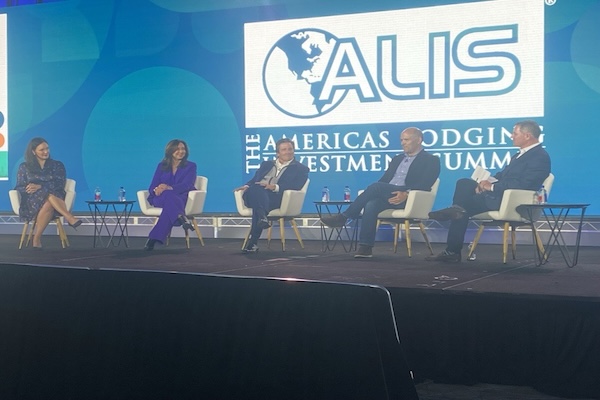LOS ANGELES — The Americas Lodging Investment Summit, here at the JW Marriott Los Angeles L.A. Live, is the first barometer of the year to assess the temperature of the collective hospitality and travel industries. The mercury in the thermometer remains high, but a lingering COVID hangover coupled with a still nebulous financial outlook are keeping things from operating at full capacity.
For the hotel industry, that means a complete return of business and international travel, along with a percolating transactions market. In a session at ALIS, focused on the state of the travel industry, Geoff Freeman, president and CEO of the U.S. Travel Association, highlighted the heights of leisure travel, but said it was now moderating off its post-COVID highs. Meanwhile, he said, both business and international travel have space to grow, each at around 85% of 2019 levels.
Of concern, Freeman pointed to a recent USTA commissioned study that found the U.S. ranks 17 out of 18 top travel markets in terms of global competitiveness, according to Euromonitor International. “Travelers aren’t choosing to come to the U.S.,” he said, concluding that part of the reason is because other destinations make it easier.
The study blamed “decades of underinvestment and a lack of focus and coordination from federal policymakers” as reasons for the U.S. becoming a laggard. Meanwhile, it said, “other countries actively apply robust strategies to increase travel and grow economic output.”
Freeman said the U.S. had 22 million fewer global visitors last year than in 2019.
One key component stymying a full return of international travel to the U.S. is the lack of Chinese inbound travel. “The Chinese travel recovery is now surging, but it’s domestically, within China,” said Jolyon Bulley, CEO, Americas, IHG Hotels & Resorts. “When are the Chinese coming our way?” he said.
Part of it is the stance the Chinese government has taken to stimulate consumption within its country, Bulley said. “They aren’t encouraging people to travel out,” he said.

One segment of travel that continues to produce is luxury—on land and sea.
“Luxury has been killing it. Rates are bananas,” an enthusiastic Peter Kern, vice chairman and CEO of Expedia Group, said.
Though COVID had a debilitating impact on Las Vegas business, Bill Hornbuckle, CEO and president of MGM Resorts International, said that it was the luxury segment that “took us to where we are today,” adding that MGM’s luxury brands are 35% up on average daily rate over 2019. “If I could do anything, I’d add more suites,” he said. “People want that experience.”
He parroted Freeman on travel to the U.S. from international destinations, calling it painful. “We are still missing the international segment,” but, he said, The Cosmopolitan made half a billion dollars in 2023.
The cruise industry has also benefitted from the luxury traveler and, as Christine Duffy, president of Carnival Cruise Line, pointed out, it’s prompted hotel companies like Four Seasons, Ritz-Carlton and Aman to launch their own cruise lines. She said that her business recorded record yields and onboard revenue in 2023. “Demand is only accelerating,” she said.
The consultancies agree. “There is an explosion around luxury travel,” said Danielle Bozarth, a senior partner at McKinsey & Company. “It’s a prioritization, especially with high-net-worth individuals.” Bozarth said there has been a palpable shift from spend on products to experiences. COVID forced people to hole up and when they couldn’t get out and travel, money was spent on things—a rush to Amazon. Now, it’s turned. “It’s better to be a travel company than a retailer,” Bozarth said.
Online travel agencies are basically a retailer for travel companies. OTAs, like Expedia, have always had a prickly relationship with the hotel industry, as they can often take a large chunk of room revenue away from owners. Executives, like Kern, try and toe the line and outline the overall benefits OTAs provide for the travel industry.
Loyalty programs are a hotel company’s most important brand, the glue that binds everything together and keeps customers spending on travel with them exclusively. In July 2023, Expedia launched One Key, a loyalty program that allows customers to accumulate cash back for future bookings. “We reward them to book through us, but we give them money to stay at your hotel,” he said, offering that if that customer booked through Expedia but became, for example, a loyal member of Marriott Bonvoy, Marriott International’s rewards program, thereafter, “there you go.”
Still, he and McKinsey’s Bozarth were skeptical of some of the reward programs offered today by hotel companies. “Over 80% don’t earn enough to get a reward they actually care about,” Kern said.
Satisfactory with loyalty programs has dropped, noted Bozarth, pointing out a dilution of benefits and the resetting of some tiers that makes it more difficult to attain valuable rewards. “People cant earn enough,” she said.
